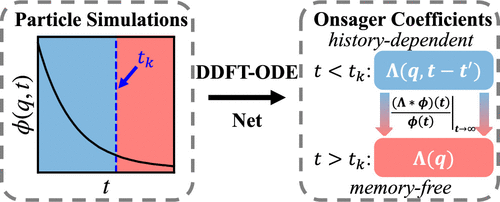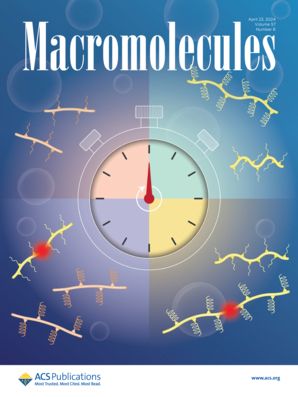用机器学习识别聚合物系统短时动力学中的记忆效应
IF 5.2
1区 化学
Q1 POLYMER SCIENCE
引用次数: 0
摘要
记忆效应是柔性大分子体系的内在特性,源于其层次化的微观结构和聚合物链在非平衡过程中的多尺度动态行为。输运系数(如Onsager系数)的非局域时间依赖性是控制集体可观测物动态演化的记忆效应的基本表现,但仍然对解析公式提出了重大挑战。在此,我们提出了一个基于机器学习的框架,直接从平均场模拟中基于粒子的单链产生的密度演化数据中提取历史相关的Onsager系数,从而使这些系数能够准确捕获潜在的微观特征。这个框架被称为动态密度泛函理论-常微分方程(DDFT-ODE)网络,它将DDFT方程嵌入到ODE网络中,提高了框架的物理一致性和计算效率。我们对理想对称双嵌段共聚物熔体密度波动弛豫的研究表明,记忆效应在早期密度演化过程中起主导作用。对Onsager系数的记忆核函数的进一步分析发现了两个特征松弛时间,它们都小于Rouse时间,这一特征表明记忆效应与短时间片段运动密切相关。通过定义两种类型的时间平均,并比较它们在长时间极限下的渐近行为,我们建立了历史依赖的Onsager系数、瞬时Onsager系数和无内存Onsager系数之间的联系,为定量评估各种DDFT实现的可靠性提供了理论基础。我们的数据驱动框架可以很容易地扩展到其他不同的系统,结合不同的基于粒子的模拟和基于连续场的DDFT方案,从而为开发复杂聚合物系统的结构-性能相关性提供了一个有用的框架。本文章由计算机程序翻译,如有差异,请以英文原文为准。

Identifying Memory Effects in Short-Time Dynamics of Polymer Systems by Machine Learning
Memory effects are intrinsic properties of flexible macromolecular systems emerging originally from their hierarchical microstructures and multiscale dynamic behaviors of polymer chains during nonequilibrium processes. The nonlocal temporal dependence of transport coefficients (e.g., the Onsager coefficient), a fundamental manifestation of memory effects that govern the dynamic evolution of collective observables, still poses significant challenges for analytical formulations. Herein, we propose a machine-learning-based framework to extract the history-dependent Onsager coefficient directly from the density evolution data, generated from particle-based single-chain in mean-field simulations, thereby enabling these coefficients to accurately capture underlying microscopic characteristics. This framework, termed the dynamic density functional theory-ordinary differential equation (DDFT-ODE) Net, embeds equations of DDFT into the ODE network, enhancing the physical consistency and computational efficiency of the framework. Our study of the relaxation of density fluctuations in an ideal symmetric diblock copolymer melt reveals that memory effects play a dominant role in determining density evolution processes at early times. Further analysis of the memory kernel function of the Onsager coefficient identifies two characteristic relaxation times, which are both smaller than the Rouse time, a signature suggesting that memory effects are closely related to short-time segmental motions. By defining two types of time averages and comparing their asymptotic behaviors at the long-time limit, we establish connections linking the history-dependent Onsager coefficient, the instantaneous Onsager coefficient, and the memory-free one, which provide a theoretical foundation for quantitatively evaluating the reliability of various DDFT implementations. Our data-driven framework is easily extensible to other different systems, combining different particle-based simulations and continuum field-based DDFT schemes, thereby providing a useful framework for developing structure–property correlations in complex polymer systems.
求助全文
通过发布文献求助,成功后即可免费获取论文全文。
去求助
来源期刊

Macromolecules
工程技术-高分子科学
CiteScore
9.30
自引率
16.40%
发文量
942
审稿时长
2 months
期刊介绍:
Macromolecules publishes original, fundamental, and impactful research on all aspects of polymer science. Topics of interest include synthesis (e.g., controlled polymerizations, polymerization catalysis, post polymerization modification, new monomer structures and polymer architectures, and polymerization mechanisms/kinetics analysis); phase behavior, thermodynamics, dynamic, and ordering/disordering phenomena (e.g., self-assembly, gelation, crystallization, solution/melt/solid-state characteristics); structure and properties (e.g., mechanical and rheological properties, surface/interfacial characteristics, electronic and transport properties); new state of the art characterization (e.g., spectroscopy, scattering, microscopy, rheology), simulation (e.g., Monte Carlo, molecular dynamics, multi-scale/coarse-grained modeling), and theoretical methods. Renewable/sustainable polymers, polymer networks, responsive polymers, electro-, magneto- and opto-active macromolecules, inorganic polymers, charge-transporting polymers (ion-containing, semiconducting, and conducting), nanostructured polymers, and polymer composites are also of interest. Typical papers published in Macromolecules showcase important and innovative concepts, experimental methods/observations, and theoretical/computational approaches that demonstrate a fundamental advance in the understanding of polymers.
 求助内容:
求助内容: 应助结果提醒方式:
应助结果提醒方式:


